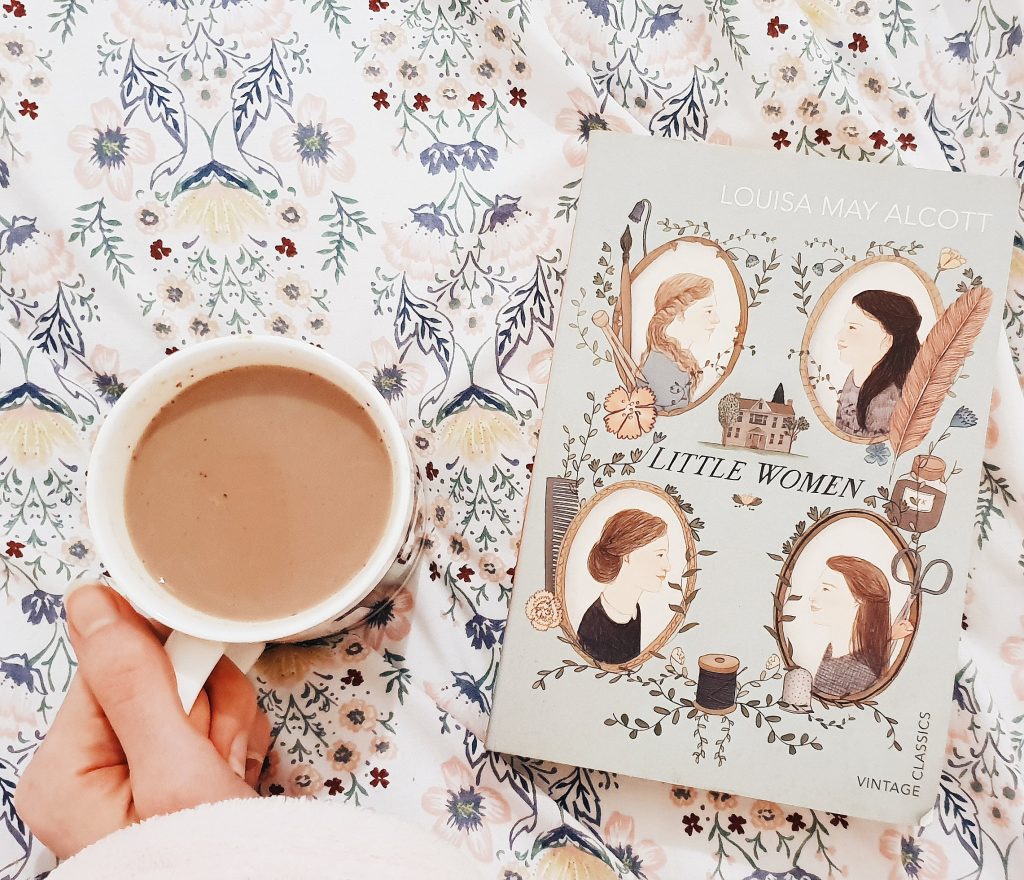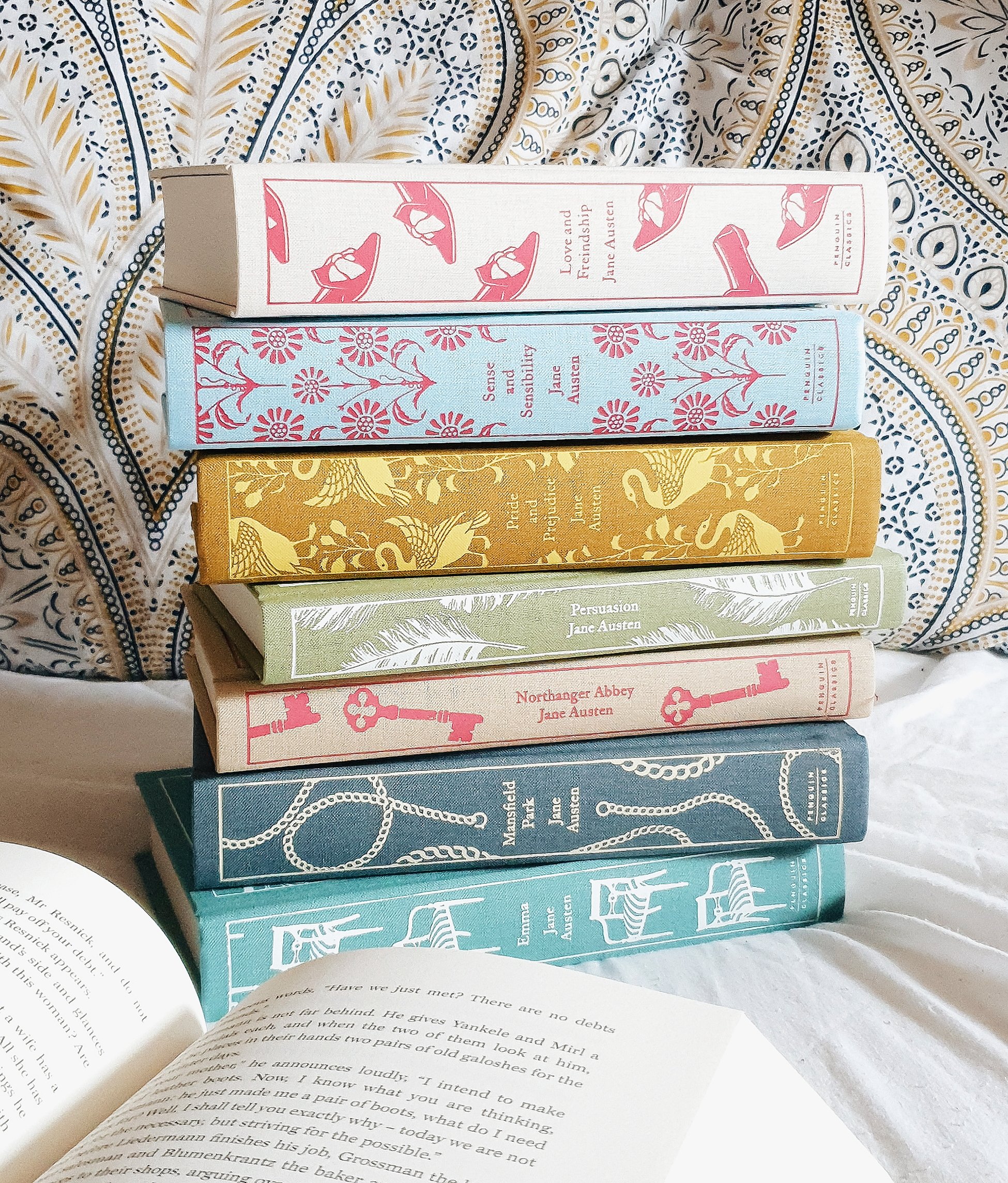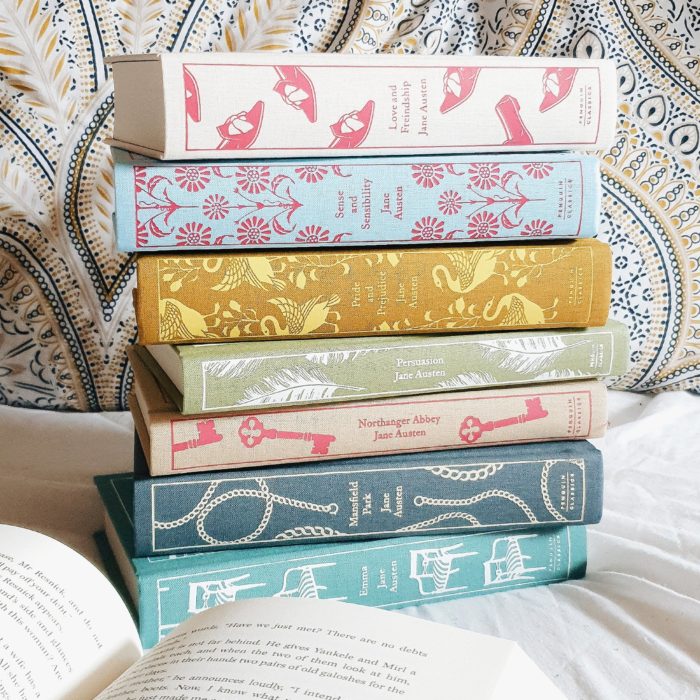Way back in January I laid out some personal goals for 2019; one of them was to read 12 classic novels in 12 months. Despite being an English Literature student, there are plenty of celebrated classics I’m yet to read. So, I intended to dive into one a month and start crossing them off my list. Can you believe I managed to solidly stick to a new years resolution? It’s new ground for me, but I’ll admit, some other goals weren’t as successful. I dipped in and out of my bullet journal, drew a little over summer, and my hope of striking a balance between social media, work, health and self-care is laughable. However, this week I officially completed my goal to read more classics.
I should note that during the last few months, with relentless university work, I did cheat slightly and opt for shorter books. Nonetheless, I found the overall challenge a lot less daunting than anticipated. So, here are my bite-sized thoughts on the 12 classic novels I read this year.

January:
Little Woman by Louisa May Alcott ☆☆☆☆
My first classic of the year didn’t disappoint. Little Women is a timeless tale about facing hardships, the constraints of poverty and social expectations, and learning from mistakes. It was such a joy to step into the March sisters’ world. Alcott intricately describes the sisters’ contrasting personalities while they learn to become true ‘little women’.
Out of the diverse bunch, I took a shine to Jo the most. I adored her delight when she stumbled upon Mr Laurence’s library, and my favourites scenes were those with her and Laurie, their wealthy next-door neighbour. Plus, she’s irritable and clumsy, of course, I can relate. The wealth of adaptations of Little Women over the past century is proof of its durability, and I can’t wait to watch Greta Gerwig’s version of the charming tale.
February:
To Kill a Mockingbird by Harper Lee ☆☆☆☆☆
This classic novel is told from the perspective of Scout, a young girl with a big heart. Through the close-knit community and court scenes, Lee illustrates the prominent racism and prejudice that is threaded throughout day-to-day life in America’s Deep South. Ever since reading this novel, Scout has held a solid position in the line-up of my all-time favourite characters. Besides being hilarious and charming, her inquisitiveness uncovers how nonsensical the prejudice towards racial minority groups is; why are these down-to-earth folk subject to such ill-treatment? Oh, and I still picture Scout running around in her iconic Halloween ham costume.
March:
Wuthering Heights by Emily Brontë ☆☆☆☆
I finally read one of the most famous love stories of all time. After burying myself in the dark and twisted romance of Cathy and Heathcliff, I understand why an 18-year-old Kate Bush felt inspired to pay homage to the literary giant with her eponymous single. This windswept classic set in the desolate Yorkshire moors had me spellbound from beginning to end. Wuthering Heights is a true Gothic tragedy, packed with unrequited love, separation, death, and everything in between.
April:
Rebecca by Daphne du Maurier ☆☆☆☆

Another tale of romantic suspense that typifies the Gothic tradition with its vivid descriptions. Since Jane Eyre is one of my all-time favourite novels, I picked up on various similarities between the books. I’m not complaining by any means. Du Maurier parallels Charlotte Brontë’s tense atmosphere with the intimidating antagonist, Mrs Danvers, and the lingering presence of Rebecca’s ghost throughout. Oozing with suspense, twists and turns, I spent hours trapped within the eerie walls of Manderley house, lost to du Maurier’s beautiful and unnerving storytelling.
May:
1984 by George Orwell ☆☆☆☆☆
The pinnacle of dystopian literature, 1984 sees the world fall to Big Brother. Every single movement is observed under its omniscient eye. Every single sound is monitored. A mere increase in heartbeat and you’re incriminated. I’d say this classic is even more chilling nowadays in our society of technology, personalised advertisements, and easily accessible information. The idea of living in a world where you are ruled by fear and oppression truly makes my blood run cold. Orwell’s world was at once unsettling but so incredibly interesting. My only negative is that I wish I had read it sooner.
June:
Persuasion by Jane Austen ☆☆☆☆☆
This surpasses Pride and Prejudice. There, I said it. While I swooned over Elizabeth and Mr Darcy, the sugar-sweet love story within Persuasion is a new-found favourite of mine. As a reticent, well-read and extremely patient character, Austen’s Anne Elliot is someone who a lot of readers can identify with, my introverted self included. I also adored Persuasion‘s unforgettable cast of characters. Some were so absurd, that alongside Austen’s sarcastic clever and witty remarks on social absurdities, I was laughing throughout a lot of this book. Austen’s remaining classic novels are high up on my TBR next year.
July:
Crime and Punishment by Fyodor Dostoyevsky ☆☆☆☆☆
June and July starred back-to-back new-found favourites when Crime and Punishment joined Persuasion in blowing me away. Having always been nervous to delve into Russian classics, I never would have thought I would enjoy this intimidating novel as much as I did. The complexities of human nature; a guilty conscience; questions of morality, a psychological journey full of plot twists and surprises―I still find myself thinking about it 5 months later. Dostoevsky took me completely by surprise.
August:
The Purple Cloud by M. P. Shield ☆☆☆
Now, this is where my choices began to dwindle. The Purple Cloud was on the reading list for my post-apocalyptic literature module. Having learned it wasn’t the easiest of books to get through, I thought I would get ahead of the game.
Being a ‘last man on earth’ novel, there was a lack of dialogue but an abundance of lengthy, dense prose that I will admit to skimming some of. However, Shiel’s writing has a mystical quality. Amid the chunky paragraphs are some of the most stunning descriptions I have ever read.
Overall, the fact that this book isn’t as popular as its fellow turn-of-the-century works surprises me. Shiel’s created an influential, unsettling story which although a task to read at times, encompasses a rich adventure and thought-provoking ideas.
September:
Frankenstein by Mary Shelley ☆☆☆
Oh, how I wanted to love this. On the run-up to the spooky season, I opted for this classic expecting a tale full of horror, unnerving Gothic elements and descriptions of that green guy with bolts protruding from his neck. Really, there is very little terror. Instead, this novel is heartrendingly sad; brimming with heavy themes of grief, loss, and questions of morality.
While I enjoyed the Monster’s perspective and Shelley’s prose was unmistakably beautiful, I wasn’t as engaged as I’d hoped to be. The plot was slow-moving, and Victor’s incessant grieving became long-winded when blaming himself as the cause of the death surrounding him. Nonetheless, it blows my mind to think that Shelley was only 19-years-old when writing. She raises such refined questions surrounding the act of ‘playing God’ and demonstrates impressive imagination at a young age.
October:
The Time Machine by H. G. Wells ☆☆.5
The lowest-rated classic of the year may surprise some die-hard sci-fi fans, but what can I say? Wells’s lengthy descriptions of his futuristic world and our strange, animalistic ancestors didn’t engage me. There’s no dismissing that this is an innovative piece of late 19th-century fiction; Wells was years before his time in terms of imagining what lies ahead for humanity. Unfortunately, the long, drawn-out sections comprising mathematics, dimensions and scientific theory during the Time Traveller’s wanderings soon bored me.
November:
Breakfast at Tiffany’s by Truman Capote ☆☆☆☆
I’m in the minority of those who haven’t seen the movie starring legendary actress, Audrey Hepburn, so upon choosing this for my monthly classic I didn’t know what to expect. But, it certainly made up for the previous disappointing few months; what a charming novella it was. Holly Golightly is an alluring café society girl who makes ends meet by dining with and receiving favours from wealthy men in eclectic New York City. She’s an enigma of sorts; she flaunts a blasé attitude however, beneath this façade is a fragile, naive young woman who evades sharing much about her past. I fell under Holly’s charm just as much as our unnamed narrator did.
December:
A Room of One’s Own by Virginia Woolf ☆☆☆☆☆
To end my challenge on a high, I found my first piece of work by Virginia Woolf fascinating. I now understand why so many deem her as a revolutionary. A Room of One’s Own is one of the founding texts of modem feminism and I enjoyed every second.

Despite the stream-of-conscious form that the essay inhabits, it was well-articulated and compelling from start to finish. Woolf guides her readers through the history of women writers while also underlining how brief and limited it is. Inquiring into women’s subjugation over the centuries, the question she repeatedly asks throughout is: “Why?”
Women are allowed, and strongly encouraged, to break the framework that was established by men and to find their own voice in literature. For women to continue the fight for a position on the bookshelf, she believes that any creative person’s mind must be androgynous; a collaboration between the woman and the man is necessary before the act of creation can be accomplished.
2020 Classic Novels
Overall, journeying through so many timeless classics reinforced my love for reading. These are the books that shaped the way we read and write today. Moreover, I’m increasingly recognising how classic novels contribute to the style, subject, and themes of contemporary fiction. I even feel a little smug whenever I pick up on subtle literary allusions authors make. With that being said, I intend on continuing the challenge in 2020, but this time round also opt for more translated literature. So, ten classic novels on my list so far are:
Emma & Sense and Sensibility by Jane Austen, Anna Karenina by Leo Tolstoy, East of Eden by John Steinbeck, One Hundred Years of Solitude by Gabriel Garcia Marquez, The Brothers Karamazov by Fyodor Dostoyevsky, North and South by Elizabeth Gaskell, The Age of Innocence by Edith Wharton, Beloved by Toni Morrison, and The Count of Monte Cristo by Alexandre Dumas.
If you have any other recommendations of classic novels you have enjoyed, be sure to let me know!
Thanks for reading!
Evie x













I love this idea. I’ve been meaning to read more classics, so I think I’ll be adding this to my own 2020 reading goals 🙂
briana | youngsophisticate.com
You should definitely give it a go! I found it such an easy way to get through them! x
Oh what an amazing idea! I’m trying to read more classics so one a month would be such a great thing for next year for myself! I loved to kill a mockingbird. I’m currently reading ‘Rebecca’ x
You should definitely give it a try then! I found I was so much more motivated to read them, and it was a lot less daunting than I thought it would be! Ah I hope you’re enjoying Rebecca! x
Can you believe I have not read a single one of these books?! I’m not hugely into classics but the few I have read, I’ve enjoyed and seemed to take quite a lot from them. So I’d like to read more. Well done for completing your goal! x
Hahaha that’s exactly why I set myself the challenge, I had only read a few before this year! I felt SO much more motivated to read them. Thank you! x
I really need to get back into reading! I think setting myself challenges similar to this would be super helpful. There’s some great recommendations in this post, I really want to read ‘Rebecca’ and the cover is so beautiful! 🙂
Soph – https://girlvsworldblog.com x
Yeah exactly, I find that if I set myself reading challenges, I’m so much more motivated! Even one every other month is manageable! Thanks for reading xx
I have made a similar goal this year! I read the 3 Brontë sister’s books, as well as crime and punishment, I recommended you read the Idiot next buy Dostoevsky. I liked it better than Crime and Punishment. Also Anne Brontë’s Agnes Grey is a quick read but still as captivating as Jane Eyre! Thanks for the list!
Oh wow, this sounds like a great achievement. I haven’t read many classics and there are a few of them you’ve read that I’d love to read – I have To Kill A Mockingbird but I haven’t gotten around to reading it yet, I’d love to read Little Women and always wanted to try a bit of Virginia Woolf. I might have to add them to my reading lists for next year! Great post, thanks for sharing!
I hadn’t read many either so I found this such a fun way to get through them! I adored all three of them so I couldn’t recommend them more! I’m definitely going to read more Virginia Woolf next year too. Thank you! xx
Your writing and photos are beautiful. I’ve read hardly any classic novels (I know), but Rebecca is my fave! I read that whilst at sixth form in English literature and fell in love, I couldn’t put it down. I have read Jane Eyre but I’ve forgotten it, so I need to re-read it! We also read Frankenstein, and I agree- it’s so, so sad! 🙁
Becky x
Ah thank you so much! Oh don’t worry haha, that’s exactly why I set myself the challenge to read them! I’m hoping to reread Jane Eyre next year as I haven’t read it since sixth form but absolutely loved it. Thanks for reading x
I absolutely love this idea! I’ve been meaning to read more classics for years but have never gotten around to it.
I couldn’t recommend giving it a go more! x
This is such a great idea Evie! I really want to read more classics and this sounds like a perfect way to do it. I might have to adopt a similar challenge for 2020!
Ah thank you Michelle, you totally should! I found I was so much more motivated to read them, and it was a lot less daunting than I thought it would be! x
I love this idea, and might give it a go myself in 2020. Maybe start with 5 classics this year (my reading habit is a fragile one, and I don’t want to risk not liking the classics and not picking up a book again). I did really enjoy “To kill a Mockingbird” and loved the “Rebecca” movie, so I might start with that one. Thanks for sharing your thoughts!
I really think that this year, I’m going to attempt this same challenge!! Unfortunately, I have quite a few classics on my bookshelves, and I really want to read them all. I might cheat & reread ones that I haven’t read for years, but hey, I’ll still be doing one classic a month :’)
You definitely should! Haha oh that still counts, I’m thinking of rereading Jane Eyre next year because it’s been yeears since I last read it
I really want to read some classic novel’s in 2020, I started reading 1984 this year but never finished it – I really need to!
Lucy | Forever September
I would love to go back and read some classic books like How To Kill A Mockingbird!
https://www.emilyclareskinner.com
1984 is one of my favourites, dystopia at its best. And the whole concept of one classic per month is really interesting.
Great list! I probably have read only 2-3 books on this list, but I’m also hoping to eventually make my way through the classics list! Crossed Jane Austen’s Emma as my last book, woot woot 🙂
http://bloomingsuitcase.com
I read Emma earlier this year and I loved it! The recent film adaptation was great too! x
I don’t think the title of your article matches the content lol. Just kidding, mainly because I had some doubts after reading the article. https://accounts.binance.com/ph/register?ref=JHQQKNKN